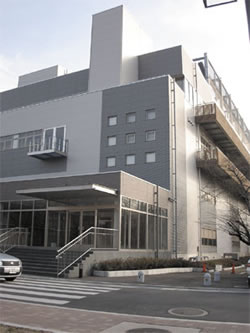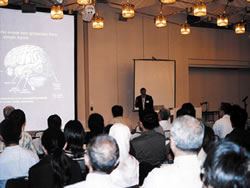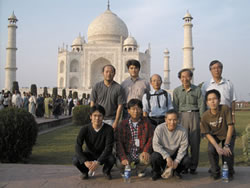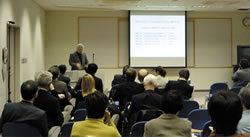BSI Ikenohata Research Building
Construction of the Ikenohata Research Building next to the BSI West Research Building was completed in March of last year. The total floor area is approximately 5,100m2. On the 1st floor are the entrance hall and the preexisting wastewater treatment facility. Animal rooms and laboratories occupy the 2nd and the 3rd floor has meeting/training rooms and laboratories. The Laboratory for Developmental Gene Regulation is now there, having transferred the zebrafish from the prefab wing to the new building last summer. The Laboratory for Biolinguistics, Head, Dr. Okanoya Kazuo of the Cognitive Development Research Group and the Tsumoto Research Unit, Unit Leader, Dr. Tsumoto Tadaharu of the Neuronal Circuit Mechanisms Research Group are both working there. The Tsumoto Research Unit will begin research in April. This facility is one of the core members of the National Bio-Resource Project, and it will contribute to the advancement of zebrafish research throughout Japan*.
*Reference site: NBRP web site (Japanese)
The 7th RIKEN BSI RETREAT
The 7th annual RIKEN BSI RETREAT was held at the Shinrin-koen Heritage Resort from October 4th-6th, 2004.
The RETREAT gathers BSI researchers of different fields and disciplines working in its various laboratories at a friendly environment away from the laboratories of foster discussion and encourage constructive feedback about on-going research and results.
350 researchers attended the 7th meeting of the RIKEN BSI RETREAT, including scientists from RIKEN-MIT Neuroscience Research Center. There were nearly 320 poster presentations.
Professor Arturo Alvarez-Buylla was invited by the 2004 planning committee to give a special lecture as part of RIKEN BSI’s research cooperation program with the UCSF (University of California, San Francisco).
“Communication Time” enabled active discussions among participants and allowed time for stimulating Q&A. This session divided participants into four groups, one of which was chaired by Susumu Tonegawa, Group Director of RIKEN-MIT Neuroscience Research Center. These broad discussions often extended beyond mainstream research and further stimulated the research efforts of participants.
Japan-Korea-China-India Workshop (NBNI)
Seven years ago RIKEN BSI and KAIST (Korean Advanced Institute of Science and Technology) in South Korea co-hosted the first Neurobiology and Neuroinformatics workshop to promote brain science research collaboration in Asia. Representatives from China and India joined subsequent workshops, which have become annual events to exchange information linking experimental and theoretical brain science activity ongoing in these countries.
The seventh meeting occurred from November 18th to 20th, 2004 at the National Brain Research Center in India. Participants stayed in a suburban hotel in Delhi. In addition to the 24 research presentations, several panel discussions and poster sessions were arranged for researchers from the four participating countries. The meeting cultivated connections between theory and practice and facilitated exchanges of the latest information. The discussions were stimulating.
Although parts of the history and culture of these Asian nations are similar, differences in economic development had been quite varied. These differences are starting to diminish, and a strong inclination toward collaboration is beginning to emerge. This trend could produce a third scientific locus that can compete with North America and Europe. Representing Japan, which is expected to assume a leadership role in the development of this locus, RIKEN BSI was fully committed to achieving great success from this workshop.
Life Long Learning Network (LLLN) Meeting
On the 21st and 22nd of January 2005 neuroscientists and educationalists assembled in BSI for the final meeting of the Lifelong Learning Network. Funded by MEXT and jointly managed by the OECD and RIKEN BSI, the network explores ways to better inform education policy and practice with emerging brain research on learning across the lifespan. RIKEN BSI hosted this year’s meeting at its facilities on the RIKEN Wako Campus.
Determining how to bring together the broad range of themes that were gathered under the umbrella of lifelong learning was the primary goal of this meeting. Tom Schuller, Head of OECD-CERI, expressed his hope that new ideas would emerge by putting these unlike groups together. Pointing to BSI’s newest research theme, Dr. Masao Ito, Special Advisor at BSI also showed how a new field of research was becoming possible through such interactions.
The structure of this year’s meeting was designed to distill the collective knowledge and concerns to basic questions of educationalists and neuroscientists and to shape those questions into strategies for future development. Members of the OECD’s “Brain and Learning” project will combine these with recommendations from the other two networks: Literacy and Numeracy. A book synthesizing the work of these networks is expected to be published by the OECD in 2006.
RIKEN Wako Institute Open Day
- Date & Time: Saturday, April 23 from 9:30 am until 4:30 pm (admission by 4:00 pm)
- Contact: RIKEN Public Relations Office
Phone: 048-467-9954
E-mail: koho@riken.jp - *Admission free *No parking space









